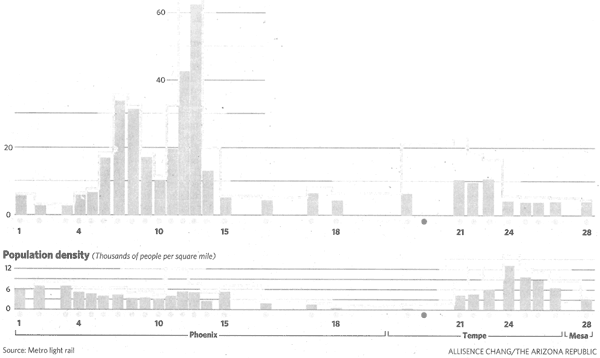Could This Be The Tipping Point for Arpaio and Thomas?
It is not uncommon for certain shady dealing to go on for years, with a small group of critics but never really breaking out into the media. We skeptics have been criticizing climate scientists for years for various problems with their temperature indexes and historical temperature reconstructions, but never really got traction until the CRU emails were made public, and then there has been a real firestorm of media attention. Criticisms that never got much traction before are now being actively investigated.
I am hoping that we have a similar situation with Sheriff Joe Arpaio and County Attorney Andrew Thomas. The story is so wacky it simply defies easy description, but Arpaio and Thomas have been pursuing a number of corruption probes against their bosses in the County government. All well and good, except for the funny fact that the targets of the probes all seem to be historic critics of Arpaio and Thomas, who have brought out their biggest guns for the one Democrat on the County Council (Arpaio and Thomas are both Republicans).
Both these men have a history of indifference to civil liberties. When Arpaio is not busy arresting folks for breathing while Mexican (he once managed to make a crime sweep through the 99% Anglo neighborhood of Fountain Hills and arrest 75% Mexicans), he likes to haul folks off to jail whose only crime is speaking out against the Sheriff . He arrested (with Thomas's help) newspaper reporters and editors who wrote critically of him. This is a man who in his paranoia invented an assassination plot (against himself, of course) and got the city to spend $500,000 protecting him. If his deputies want to see a defense attorney's working papers, they just take them. If he can't get a judge to release computer records, he has his posse storm into the County computer center and take it over at gunpoint.
Most recently, Thomas and Arpaio wanted a judge who has handed them a number of court losses removed from a certain case. To make that happen, Arpaio and Thomas bizarrely charged the judge and numerous other county employees in a giant RICO case, a case attorneys are still laughing about because it was so transparent and shoddy. When that didn't work, he charged the judge with felony bribery, apparently on the interesting theory that getting a new, updated court house building was effectively a bribe to the judges working there.
It gets much weirder even than this, with Arpaio's stealing documents from a defense counsel in court (caught on video) with this same judge holding Arpaio's deputy in contempt for the action and then the sheriff's deputies essentially going on strike at court, refusing to bring in prisoners.
But after years of fawning, positive publicity as "Americas Toughest Sheriff," the dam may finally be breaking. When the AZ Republic finally covers it, you know the situation has to be bad:
Hundreds of attorneys gathered on the courthouse steps in downtown Phoenix to protest Thomas and Arpaio's public campaign against public corruption.
LOL, I have a picture of these guys with suits and holding placards. Anyway, this was a real blow:
And, in a scathing letter to The Arizona Republic, the Yavapai County attorney
, who previously handled some of Thomas' cases against county officials, blasted the prosecutor and sheriff as "a threat to the entire criminal-justice system."
Oops, so much for the respect of your peers. Shelia Polk, the Yavapai County attorney (that is a neighboring county) handled the investigations into some of Arpaio and Thomas's early charges against our County officials, so she knows the details of the story. And she is a Republican, the same party as Arpaio and Thomas:
In her letter, Polk wrote that although Maricopa County isn't her jurisdiction, she can't sit by and watch the abuses from a distance anymore.
"I am conservative and passionately believe in limited government, not the totalitarianism that is spreading before my eyes," she wrote. "The actions of Arpaio and Thomas are a disservice to the hundreds of dedicated men and women who work in their offices and a threat to the entire criminal-justice system."
Polk had stayed out of the legal drama in Maricopa County, and her remarks offer the first insight from an outside law-enforcement official who has some knowledge of the cases Arpaio and Thomas have lodged against county officials.
Arpaio's response was predictable:
Hendershott spoke on behalf of Arpaio. Hendershott said that Polk's office repeatedly failed to issue subpoenas the Sheriff's Office needed.
"It seemed clear to us that this case was being deliberately stalled," he said. "We basically let her know that her work product was ineffective."
This is a constant refrain from the sheriff - anyone who seeks to impose any limit on his power is therefore evil and conspiring to thwart his will. It comes up time and time again - he simply does not react well when denied a subpoena, or a search warrant, or access to certain information. If they are not rubber stamping Sheriff Joe's requests, then they must be corrupt. If he had been honest, his RICO charges would have simply read "they didn't give me what I want." But there is a reason these third parties are part of the process, and you can see it in Polk's letter:
Polk said she worked with the Sheriff's Office on the cases for the next six months, then returned the cases to the Maricopa County Attorney's Office.
In Polk's letter, she wrote that she was "happy to remove myself from the cases and from contact with Sheriff Arpaio. My discomfort grew daily and my role in restraining potential abuses of power increasingly more difficult."

